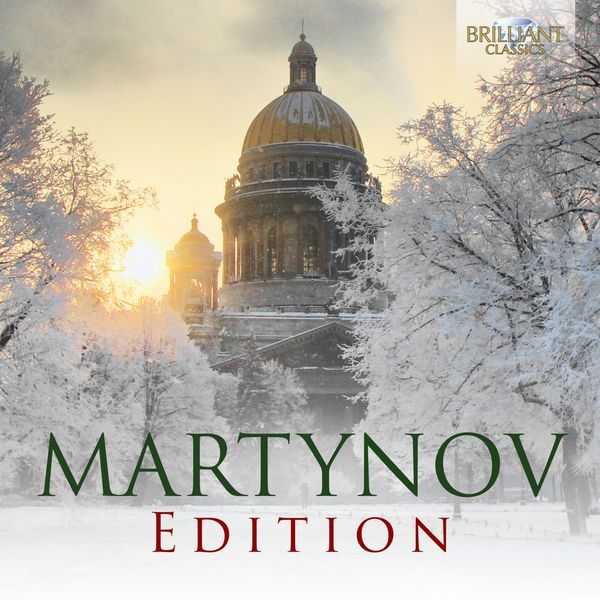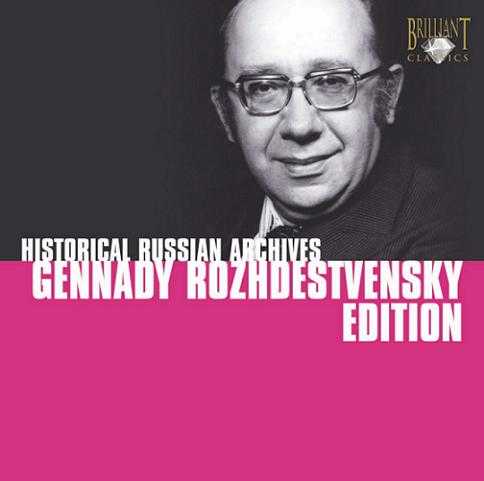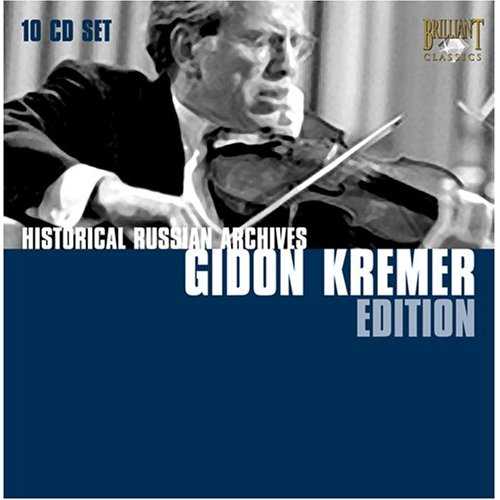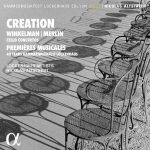
Composer: Vladimir Martynov
Performer: Grand Children Choir named after Viktor Popov, Academy of Early Music Ensemble of the Moscow Philharmonic, Opus Posth Ensemble, The Sirin Vocal Ensemble, Tatiana Grindenko, Alexei Lubimov, Dmitry Pokrovsky Folk Ensemble, Eugene Buskov
Orchestra: Vladimir Symphony Orchestra, New Russia Symphonic Orchestra
Conductor: Georgi Zhuravlev, Tatiana Grindenko, Andrey Kotov, Artem Markin
Number of Discs: 7
Format: FLAC (tracks)
Label: Brilliant Classics
Catalogue: 96380
Release: 2022
Size: 2.22 GB
Recovery: +3%
Scan: yes
Christmas Music
Pt. 1, Book for Instruments:
01. I. Prelude for the Star and the Three Knights
02. II. Prelude for Angels and Shepherds
03. III. Prelude for Children
Pt. 2, Book of Songs
04. No. 1
05. No. 2
06. No. 3
07. No. 4
08. No. 5
09. No. 6
10. No. 7
11. No. 8
Night in Galicia
12. I. A-A-A O-O-O EH-EH-EH EE-EE-EE OO-OO-OO
13. II. The Meadow’s Lowing Now is Sinking
14. III. Your Lips Are the Black Grouse’s Brow
15. IV. Wind, is That You?
16. V. In the Gorge Where the Dog Rose Blooms
17. VI. As the Future’s my Witness
18. VII. Ever These Shades Draw me In!
19. VIII. Like a Black Wind
20. IX. From an Old Rowboat’s Transom
21. X. Wind, you Hear, This Deed is Frightful!
Requiem
22. I. Introitus
23. II. Kyrie
24. III. Offertorium
25. IV. Sanctus
26. V. Angus Dei
27. VI. Lux Acterna
Stabat Mater
28. I. Stabat Mater
Requiem
29. II. O quam tristis, quis est Homo
30. III. Pro peccatis, ela, Mater
31. IV. Virgo Virginum
32. Dance with the Dead Friend
33. Come In!
Lamentations of Jeremiah
34. I. Prologue 1
35. II. Chapter I
36. III. Prologue 2
37. IV. Chapter II
38. V. Prologue 3
39. VI. Chapter III
40. VII. Prologue 4
41. VIII. Chapter IV
42. IX. Prayer of the Prophet Jeremiah
43. Der Abschied
44. Singapore I
45. Singapore II
The most comprehensive survey ever assembled on record of a major Russian composer working in the post-Soviet school of simplicity and transcendence. Vladimir Martynov (born 1946) is one of the leading composers of the Russian avant-garde, an experimentalist of serial, minimalist and electronic music. His ethno-musicological studies into the folk music of Russia, his philosophical and religious ideas and his great knowledge of Renaissance polyphony as well as Orthodox Chant all inspired his compositions. His principles are: commitment to traditional rules; modality as a constant feature of musical language; and repetitiveness as a means of immersion in states of prayer, mantra, and ritual in general. This set, compiled for his 75th birthday, presents sacred vocal works: performed by famous musicians from the composer’s close circle: pianist Alexei Lubimov, Tatiana Grindenko, the Sirin Choir, Op Posth Ensemble, Dmitri Pokrovsky Ensemble and others. A valuable tribute to one of the most original and moving voices of present day Russia.
Vladimir Martynov is one of several composers from the former USSR whose music taps into a vein of perpetual memory and farewell. Literally so in the case of Der Abschied, an eight-movement cycle for small ensemble which stands on the threshold like a guest at a gathering of friends, unable or unwilling to shut the door behind them and venture out alone. There are notable ancestors for this style among the Austro-German Romantics, especially Franz Schubert, but the style itself became defined by composers such as Martynov towards the end of the last century, and continues into this one, touched by an ineffable melancholy which seems to recognise an end-point for music itself, and takes comfort in the fragmentary recovery of melody and harmony from an Edenic state of Classicism.
One of Martynov’s most distinguished contemporaries was the Ukrainian composer Valentin Silvestrov, who talked of a “genetic aural well” for Russian music which, like Orthodox prayer, cannot be learnt as a text, but which exists beyond any text. Silvestrov explicitly recognised his own output as “meta-music” or even “post-music”, and the same could be said of many pieces in Martynov’s output. Tiny motifs and gestures are layered and expanded across a meditative space in a distinctively Russian form of Minimalism that bears certain similarities with the better-known outputs of Pärt and Schnittke but pursues a consciously more austere path: both the Requiem and Stabat Mater are imbued with the timeless qualities of chant and ancient melisma.
Martynov’s music began to attract a certain cult following in the West during the 1990s with performances and recordings made principally by the violinist Gidon Kremer and his former partner, Tatiana Grindenko. As both both a violinist and conductor, Grindenko has continued to keep Martynov’s flame burning, and she leads most of the performances here, which were made mostly in Moscow over the course of several years and in several cases receive here their first international release.
This collection is introduced by a major new essay from Alexei Lubimov (another performer who, like Grindenko, has been immersed in the composer’s output for decades) and features extensive notes on the individual works. As Lubimov concludes: “In the combination of his various roles as “non-composer”, scholar, creator of his own rituals, provocateur to the audience, Martynov succeeds to an astonishing degree in putting his finger on the points of pain in our time, and offers us the hope of healing through music”.



